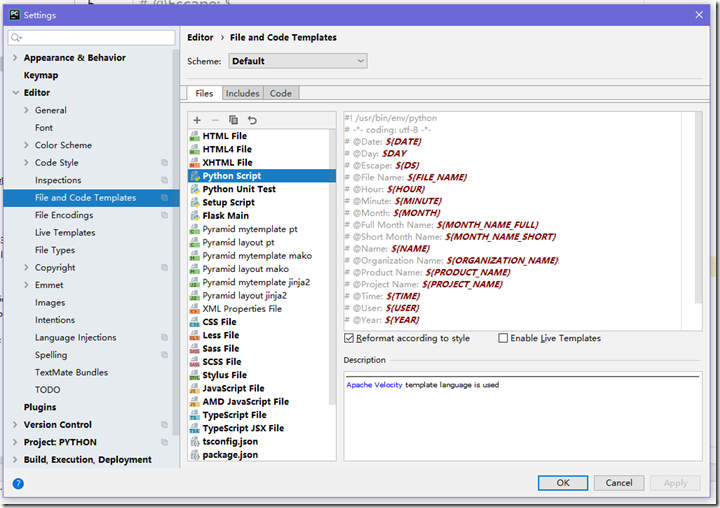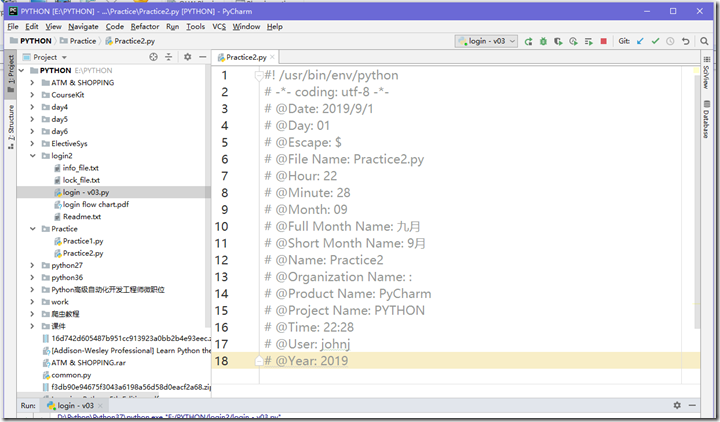点击这里查看JetBrains官方英文源文件
本篇Blog只是搬运外加大概翻译一下。
File template variables
A file template can contain variables, which are replaced by their values when the template is applied. A variable is a string that starts with a dollar sign $ followed by the variable name. The variable name may optionally be enclosed in curly braces. For example: $MyVariable and ${MyVariable} are different notations of the same variable.
文档模板变量
文档模板可以包含变量,应用模板后,这些变量可以被它们的值替换。一个变量就是一个字符串,这个字符串以一个dollar符”$”开始后接变量名。变量名可以选择用大括号”{}”括起来。如:$MyVariable和${MyVariable}是相同的变量但符号不同。
Predefined template variables
The following predefined variables can be used in file templates:
| Variable | Description |
| ${DATE} | Current system date |
| ${DAY} | Current day of the month |
| ${DS} | Dollar sign $. This variable is used to escape the dollar character, so that it is not treated as a prefix of a template variable. |
| ${FILE_NAME} | Name of the new file |
| ${HOUR} | Current hour |
| ${MINUTE} | Current minute |
| ${MONTH} | Current month |
| ${MONTH_NAME_FULL} | Full name of the current month(January, February, and so on) |
| ${MONTH_NAME_SHORT} | First three letters of the current month name(Jan, Feb, and so on) |
| ${NAME} | Name of the new entity(file, class, interface, and so on) |
| ${ORGANIZATION_NAME} | Name of your organization specified in the project settings(Ctrl+Shift+Alt+S) |
| ${PRODUCT_NAME} | Name of the IDE(for example, PyCharm) |
| ${PROJECT_NAME} | Name of the current project |
| ${TIME} | Current system time |
| ${USER} | Login name of the current user |
| ${YEAR} | Current year |
预设模板变量
下表预设的变量可用在文档模板中:
| 变量 | 描述 |
| ${DATE} | 当前系统日期 |
| ${DAY} | 某个月的当前日 |
| ${DS} | Dollar符$。这个变量用来转义dollar字符,这样它就不会被视为模板变量的前缀 |
| ${FILE_NAME} | 新文件的名称 |
| ${HOUR} | 当前小时 |
| ${MINUTE} | 当前分钟 |
| ${MONTH} | 当前月份 |
| ${MONTH_NAME_FULL} | 当前月份的全称(January, February, 依此类推) |
| ${MONTH_NAME_SHORT} | 当前月份名称的头三个字母(Jan, Feb, 依此类推) |
| ${NAME} | 新实体的名称(文档,类,界面,依此类推) |
| ${ORGANIZATION_NAME} | 在项目设定中指定的单位名称(Ctrl+Shift+Alt+S) |
| ${PRODUCT_NAME} | IDE名称(如:PyCharm) |
| ${PROJECT_NAME} | 当前的项目名 |
| ${TIME} | 当前系统时间 |
| ${USER} | 当前用户的登录名 |
| ${YEAR} | 当前年份 |
Custom template variables
Besides predefined template variables, it is possible to specify custom variables. If necessary, you can define the values of custom variables right in the template using the #set directive.
For example, if you want to use your full name instead of your login name defined through the predefined variable ${USER}, use the following construct:
#set( $MyName = "John Smith" )If the value of a variable is not defined in the template, PyCharm will ask you to specify it when the template is applied.
定制的模板变量
除了预设定的模板变量,定制的变量也是可以的。必要的话,你可以在模板中使用#set指令自定义一些变量的值。
举例,如果你想通过预设变量${USER}用你的全名替代你的登录名,就使用下面的语法结构:
#set( $MyName = "John Smith" )在模板中,如果变量的值没有定义的话,当模板应用后PyCharm会要求你进行设定。
下面我们用PyCharm看下实例


转载于:https://www.cnblogs.com/infinitecodes/p/11444051.html
最后
以上就是隐形哈密瓜最近收集整理的关于Pycharm文档模板变量File template variablesPredefined template variablesCustom template variables的全部内容,更多相关Pycharm文档模板变量File内容请搜索靠谱客的其他文章。








发表评论 取消回复